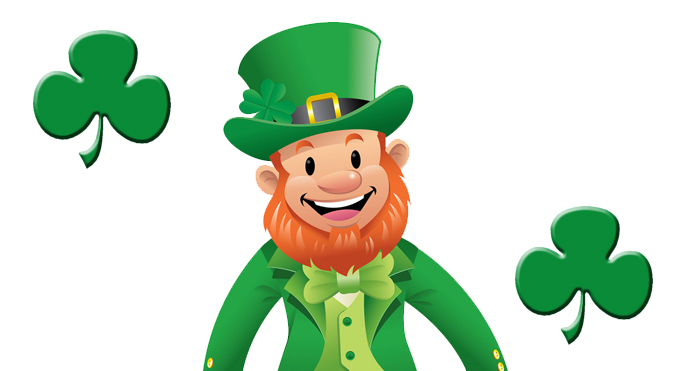
by Evelyn J. Mocbeichel

Do the Irish really say “The top of the morning to you” when greeting someone as might be shown in a film location in Ireland or with Irish characters portrayed? Maybe some do, but besides this popular phrase, there are scores of words that come from the Irish language, known as Gaelic (Gaelige), which is a Celtic language. This is the official language of Ireland. If you have ever seen it written, like we did changing planes in Dublin Airport, it is extremely difficult to read. Some of the Irish words that have become incorporated into our American vernacular, we may not even realize their origin. We know that the color green and the shamrock are symbols of Ireland and that the leprechaun and his pots of gold are part of their mythical legends. But it is surprising how many Irish words we have been using over the years and understood their meaning.
In films when a character has a brogue, we usually associate this regional accent with someone Irish or in some cases Scotch, the only two languages with such a description. Back in the early to mid nineties, Montauk had a large number of Irish students working here during the summer. So it was not unusual to hear store clerks, wait staff and other employees with this charming accent when dining out or shopping. Speaking of restaurants, there used to be one in Montauk called The Old Shebeen, which the strict translation of shebeen meant “a mugful”. The underscoring description of the word was an “unlicensed house selling alcohol”. Here is Montauk it was a popular (and of course fully licensed) restaurant/pub and place to meet friends for a drink after work or a day at the beach. A popular drink was a whisky, and the translation for that from Gaelic is “water of life”. Hopefully during a night of partying, there was no need to evict any hooligans, another Irish root word that describes a rowdy person that also was prone to vandalism. If someone tried to start acting up, with any annoying shenanigans, (carrying on and doing annoying things or pranks) a kibosh (put an end to that action) would immediately be resolved by a burly doorman hired to take care of such incidents. This way no glassware could go flying and break into smithereens, which is a word that means into small pieces. The word smithereen is found around the late 1700’s and may come from Gaelic smiodar, which means “fragment.” When adding an een (which is a diminutive suffix) to a word makes it small.
If you are a fan of horror films or gothic mysteries, then you know what is coming if someone hears a banshee sound. In Irish mythology it is an ominous sign as it means the coming of a death. Following another eerie reference and there are the gothic films where nothing good happens when walking alone through the “bog”, which is usually an isolated marsh or wetlands.
Growing up in the Bronx as a little girl there were many Irish families in our neighborhood, as there were throughout the city back in those days. Many of these slang expressions seem so familiar to me that they appear to be ordinary dialogue now. Here are some of the most popularly used ones: Gander – to take a quick look at something, “Take a gander at this”. Get a crack on – Get going, move faster, Mortified – being highly embarrassed, Gawk – Stare at someone in a rude manner (“stop gawking at me”) Now this is a really old time expression, Ossified – “we drank so much we were ossified” (got drunk), To say someone was “as thick as a plank”, meant they were extremely stupid. And this one I heard more than once or twice as a young girl when my mother told me to do my chores and I put on a sulky looking face. “Young lady take that puss off your face.” Happy to say that one last Irish tradition that was something that got me to smile was when my mother baked some scones, tea biscuits or Irish Soda Bread around during the month of March. Although we weren’t Irish, it was a nice way to celebrate the coming St. Patrick’s Day holiday.

